

Board Observers Weekly - August 5th, 2014. More than 10 ways to profit from startup hyper-growth. “Gains from the growth accrue to the private investor, not the public investor”.
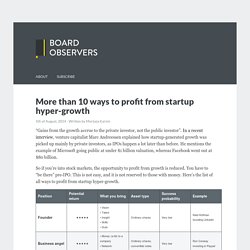
In a recent interview, venture capitalist Marc Andreessen explained how startup-generated growth was picked up mainly by private investors, as IPOs happen a lot later than before. He mentions the example of Microsoft going public at under $1 billion valuation, whereas Facebook went out at $80 billion. So if you’re into stock markets, the opportunity to profit from growth is reduced. You have to “be there” pre-IPO. This is not easy, and it is not reserved to those with money. One fundamental law of investing appears here: the bigger the risk, the greater the potential return. Feel free to suggest any missing item in the list: contact@boardobservers.com. The Happy Demise of the 10X Engineer. Whatsapp had 450 million monthly users and just 32 engineers when it was acquired.
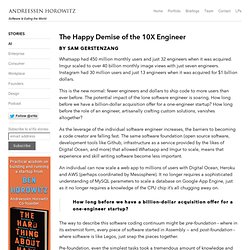
Imgur scaled to over 40 billion monthly image views with just seven engineers. Instagram had 30 million users and just 13 engineers when it was acquired for $1 billion dollars. This is the new normal: fewer engineers and dollars to ship code to more users than ever before. The potential impact of the lone software engineer is soaring. How long before we have a billion-dollar acquisition offer for a one-engineer startup? As the leverage of the individual software engineer increases, the barriers to becoming a code creator are falling fast. An individual can now scale a web app to millions of users with Digital Ocean, Heroku and AWS (perhaps coordinated by Mesosphere). The Dentist Office Software Story. I’ve been telling this fictional story about Dentist Office Software for years to describe why we are so focused on our “networks” investment strategy.
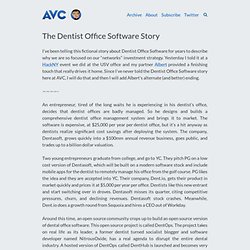
Yesterday I told it at a HackNY event we did at the USV office and my partner Albert provided a finishing touch that really drives it home. Since I’ve never told the Dentist Office Software story here at AVC, I will do that and then I will add Albert’s alternate (and better) ending. An entrepreneur, tired of the long waits he is experiencing in his dentist’s office, decides that dentist offices are badly managed. So he designs and builds a comprehensive dentist office management system and brings it to market. The software is expensive, at $25,000 per year per dentist office, but it’s a hit anyway as dentists realize significant cost savings after deploying the system. Now That I've Created Something, How Do I Spread It? A long time ago, a guy flew a kite in a storm.

When lightning struck it, the current traveled down the string of the kite to a key, giving the victim a jolt of electricity. Who was that famous scientist? Jacques de Romas. Wait, that's not right. Wasn't it Benjamin Franklin? Well, not according to historians. So what's the point? So why aren't grade school kids taught about Thomas-François Dalibard's discovery. I enjoy helping entrepreneurs figure out how to start and grow businesses. In a paper studying how we can predict success, researchers found that given a market where people are trying to pick things that are of good quality (e.g., movies, music), as soon as you give consumers extra social information (e.g., number of downloads, likes, stars, votes), the success of good products becomes unpredictable.
The dumbest guy in the room. I rowed crew in college.
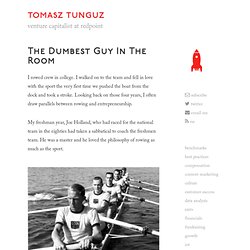
I walked on to the team and fell in love with the sport the very first time we pushed the boat from the dock and took a stroke. Looking back on those four years, I often draw parallels between rowing and entrepreneurship. My freshman year, Joe Holland, who had raced for the national team in the eighties had taken a sabbatical to coach the freshmen team.
He was a master and he loved the philosophy of rowing as much as the sport. When I asked him how he became such a great athlete, he said, “I made sure I was always the slowest guy in the boat. Eight years later, I started at Redpoint. When the management team gathered, Reed wanted to be the dumbest guy in the room. In fact, reading through Netflix’s culture slides, you’ll find gems like: Imagine if everyone at Netflix is someone you respected and could learn from Adequate performance gets a generous severance package. Overview - Marc Andreessen Tweetstorm. The experience economy. Before World War 2, the middle-class in the developed world struggled to afford basic needs.
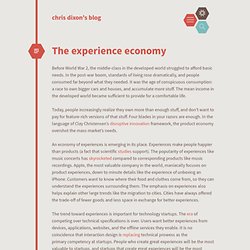
In the post-war boom, standards of living rose dramatically, and people consumed far beyond what they needed. It was the age of conspicuous consumption: a race to own bigger cars and houses, and accumulate more stuff. The mean income in the developed world became sufficient to provide for a comfortable life. Today, people increasingly realize they own more than enough stuff, and don’t want to pay for feature-rich versions of that stuff. Four blades in your razors are enough.